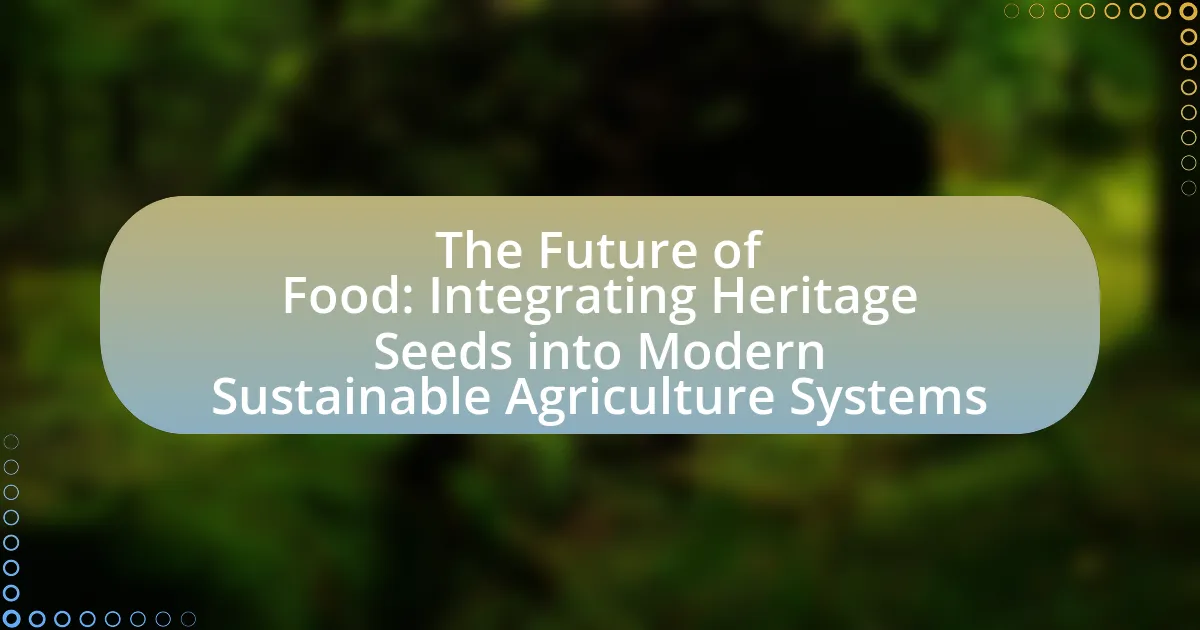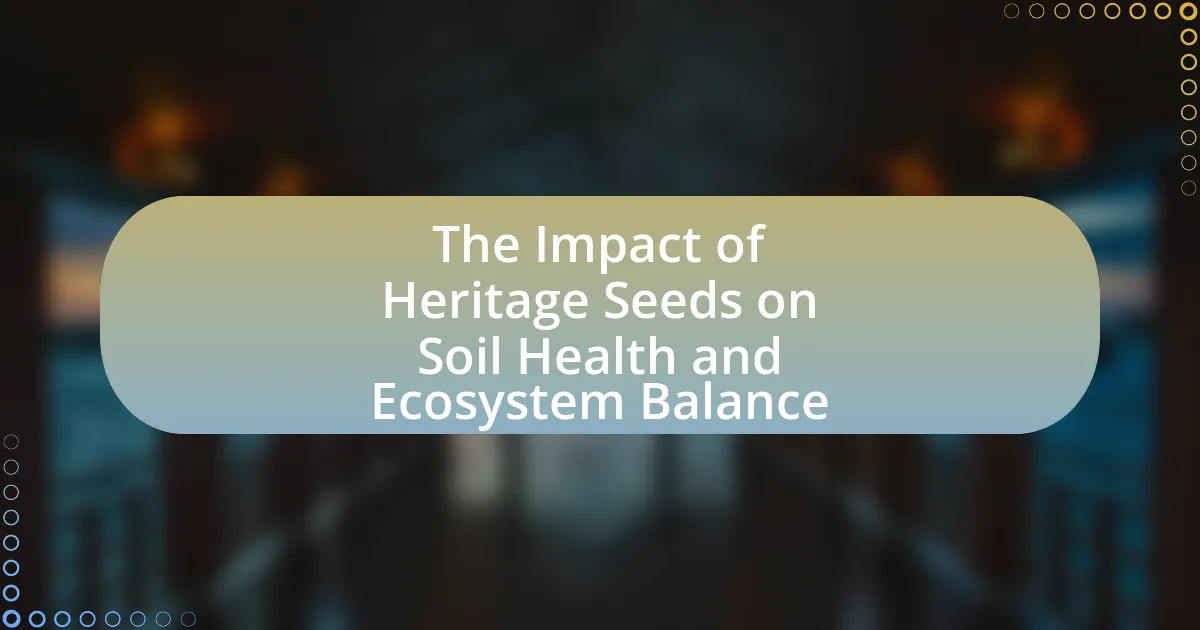Heritage seeds are traditional seed varieties that have been preserved over generations, playing a crucial role in promoting biodiversity and sustainable agriculture. This article explores the significance of heritage seeds in enhancing genetic diversity, resilience against pests and diseases, and their adaptability to local environments. It contrasts heritage seeds with hybrid and GMO seeds, highlighting their benefits for food security and ecosystem stability. Additionally, the article discusses the cultivation practices associated with heritage seeds, their impact on soil health and pest management, and the challenges and opportunities in their adoption within agricultural systems.

What are Heritage Seeds and Their Importance in Agriculture?
Heritage seeds are traditional seed varieties that have been passed down through generations, often characterized by their adaptability, resilience, and unique flavors. Their importance in agriculture lies in their role in preserving biodiversity, as they contribute to a diverse gene pool that can enhance ecosystem stability and resilience against pests and diseases. According to the Food and Agriculture Organization, heritage seeds are crucial for food security, as they can withstand changing climate conditions and provide farmers with options that are better suited to local environments. Additionally, these seeds support sustainable agricultural practices by promoting soil health and reducing reliance on chemical inputs, thereby fostering a more sustainable food system.
How do Heritage Seeds differ from Hybrid and GMO Seeds?
Heritage seeds are open-pollinated varieties that have been passed down through generations, differing from hybrid and GMO seeds in their genetic makeup and cultivation practices. Unlike hybrid seeds, which are created by crossbreeding two different parent plants to produce specific traits, heritage seeds maintain genetic diversity and are adapted to local growing conditions. GMO seeds, on the other hand, are genetically modified through biotechnology to express traits such as pest resistance or herbicide tolerance, which can lead to reduced biodiversity. Heritage seeds promote biodiversity by preserving traditional varieties that are often more resilient to environmental changes and diseases, thus supporting sustainable agriculture practices.
What characteristics define Heritage Seeds?
Heritage seeds are defined by their open-pollinated nature, which allows them to be naturally pollinated and produce seeds that are true to type. These seeds are typically heirloom varieties, meaning they have been passed down through generations, often for at least 50 years, and are valued for their genetic diversity, adaptability to local conditions, and unique flavors. Heritage seeds contribute to biodiversity by preserving traditional plant varieties that may be better suited to specific climates and soils, thus enhancing resilience in agricultural systems. Their cultivation supports sustainable agriculture practices by reducing reliance on hybrid seeds and promoting ecological balance.
Why are Heritage Seeds considered more resilient?
Heritage seeds are considered more resilient because they have been naturally selected over generations for their adaptability to local environments and conditions. This adaptability allows them to withstand pests, diseases, and climate variations more effectively than modern hybrid seeds. Studies have shown that heritage varieties often possess a wider genetic diversity, which enhances their ability to cope with environmental stressors. For instance, research published in the journal “Agricultural Systems” highlights that crops grown from heritage seeds can yield better under adverse conditions due to their robust genetic traits.
What role do Heritage Seeds play in biodiversity?
Heritage seeds play a crucial role in biodiversity by preserving genetic diversity within plant species. These seeds, often heirloom varieties, maintain traits that are adapted to local environments and resist pests and diseases, contributing to ecosystem resilience. Research indicates that heritage seeds can enhance agricultural biodiversity, as they support a wider range of crops and promote soil health, which is essential for sustainable farming practices. For example, a study published in the journal “Agriculture, Ecosystems & Environment” highlights that diverse crop varieties can improve ecosystem services and increase yields under varying climatic conditions.
How do Heritage Seeds contribute to genetic diversity?
Heritage seeds contribute to genetic diversity by preserving a wide range of plant varieties that have adapted to local environments over generations. These seeds maintain unique genetic traits that can enhance resilience to pests, diseases, and climate variations, which is crucial for sustainable agriculture. For example, a study published in the journal “Agriculture, Ecosystems & Environment” highlights that heritage seeds can contain traits that improve yield stability and nutritional quality, thereby supporting diverse agricultural ecosystems. By cultivating heritage seeds, farmers can ensure a broader genetic base, which is essential for food security and ecological balance.
What ecosystems benefit from the use of Heritage Seeds?
Heritage seeds benefit agroecosystems, particularly those focused on sustainable agriculture and biodiversity conservation. These seeds contribute to the preservation of genetic diversity, which is crucial for ecosystem resilience and adaptability. Studies show that agroecosystems utilizing heritage seeds can enhance soil health, promote beneficial insect populations, and improve crop yields through natural pest resistance. Additionally, heritage seeds support local ecosystems by fostering traditional farming practices that maintain the ecological balance and promote sustainable land use.

How do Heritage Seeds Promote Sustainable Agriculture?
Heritage seeds promote sustainable agriculture by preserving genetic diversity and enabling farmers to cultivate crops that are well-adapted to local conditions. These seeds, often passed down through generations, are resilient to pests and diseases, reducing the need for chemical inputs. Research indicates that heritage varieties can yield better results in specific environments compared to commercial hybrids, which often require uniform conditions and extensive agricultural inputs. For instance, a study published in the journal “Agriculture, Ecosystems & Environment” found that heritage varieties can enhance soil health and biodiversity, contributing to more sustainable farming practices.
What practices are associated with the cultivation of Heritage Seeds?
Practices associated with the cultivation of Heritage Seeds include seed saving, organic farming, and crop rotation. Seed saving involves collecting seeds from mature plants to preserve genetic diversity and maintain local varieties. Organic farming emphasizes the use of natural fertilizers and pest control methods, which align with the traditional cultivation methods of Heritage Seeds. Crop rotation helps maintain soil health and reduces pest and disease cycles, further supporting the sustainability of Heritage Seed cultivation. These practices collectively contribute to biodiversity and resilience in agricultural systems.
How do these practices enhance soil health?
Heritage seed practices enhance soil health by promoting biodiversity, which leads to improved soil structure and nutrient cycling. The use of diverse heritage seeds increases the variety of root systems in the soil, allowing for better aeration and water infiltration. Research indicates that diverse plant species can enhance microbial diversity, which is crucial for nutrient availability and organic matter decomposition. For instance, a study published in the journal “Agriculture, Ecosystems & Environment” by Altieri and Nicholls (2017) highlights that agroecological practices, including the use of heritage seeds, significantly improve soil organic carbon levels, thereby enhancing soil fertility and resilience.
What impact do Heritage Seeds have on pest management?
Heritage seeds positively impact pest management by promoting biodiversity and enhancing ecosystem resilience. These seeds, which are traditional varieties, often possess natural resistance to pests and diseases due to their genetic diversity. Research indicates that diverse plantings can disrupt pest life cycles and reduce infestations, as seen in studies where polycultures of heritage crops led to lower pest populations compared to monocultures. Additionally, heritage seeds support beneficial insects, which are crucial for natural pest control, thereby reducing the need for chemical pesticides.
Why are Heritage Seeds vital for food security?
Heritage seeds are vital for food security because they preserve genetic diversity, which is essential for adapting to changing environmental conditions and combating pests and diseases. This genetic diversity allows farmers to select varieties that are best suited for their local climates and soil types, ensuring stable crop yields. According to the Food and Agriculture Organization (FAO), approximately 75% of the world’s food crops are derived from just 12 plant species, highlighting the risk of relying on a narrow genetic base. Heritage seeds, by contrast, encompass a wide range of varieties, thus enhancing resilience in agricultural systems and contributing to sustainable food production.
How do Heritage Seeds support local food systems?
Heritage seeds support local food systems by preserving genetic diversity and enabling farmers to cultivate crops that are well-adapted to local climates and soils. This adaptability enhances food security and resilience against pests and diseases, as diverse crops can better withstand environmental challenges. Research indicates that heritage seeds contribute to sustainable agriculture by promoting biodiversity, which is essential for ecosystem health and productivity. For instance, a study published in the journal “Agriculture, Ecosystems & Environment” highlights that diverse cropping systems, including those utilizing heritage seeds, can lead to improved yields and reduced reliance on chemical inputs.
What challenges do Heritage Seeds help mitigate in agriculture?
Heritage seeds help mitigate challenges such as loss of biodiversity, soil degradation, and climate resilience in agriculture. These seeds are often heirloom varieties that have adapted to local conditions over generations, promoting genetic diversity which is crucial for ecosystem stability. Research indicates that using heritage seeds can enhance soil health by improving nutrient cycling and reducing the need for chemical fertilizers, as they are typically more resilient to pests and diseases. Additionally, heritage seeds contribute to climate adaptation by providing crops that can withstand extreme weather conditions, thereby ensuring food security in changing climates.

What are the Challenges and Opportunities in Using Heritage Seeds?
The challenges in using heritage seeds include limited availability, susceptibility to pests and diseases, and lower yields compared to modern hybrids. These factors can hinder farmers’ willingness to adopt heritage seeds, as they may prioritize higher productivity and economic returns. Conversely, opportunities presented by heritage seeds involve enhancing biodiversity, preserving genetic diversity, and promoting sustainable agricultural practices. Heritage seeds can adapt better to local conditions and contribute to ecosystem resilience, which is increasingly important in the face of climate change. Studies have shown that diverse cropping systems, including heritage varieties, can improve soil health and reduce dependency on chemical inputs, thereby supporting sustainable agriculture.
What barriers exist in the adoption of Heritage Seeds?
Barriers in the adoption of Heritage Seeds include limited availability, lack of awareness, and regulatory challenges. Limited availability arises from the reduced commercial production of these seeds, making them harder to find for farmers. Lack of awareness stems from insufficient education on the benefits of Heritage Seeds, which can lead to a preference for hybrid varieties that are often marketed more aggressively. Regulatory challenges involve stringent seed certification processes that can hinder the distribution and use of Heritage Seeds, as seen in various agricultural policies that favor modern hybrids over traditional varieties.
How do market dynamics affect the use of Heritage Seeds?
Market dynamics significantly influence the use of Heritage Seeds by determining their availability, pricing, and consumer demand. As consumer preferences shift towards organic and locally sourced products, the demand for Heritage Seeds has increased, encouraging farmers to adopt these varieties for their unique flavors and resilience. Additionally, market trends that favor biodiversity and sustainable practices further promote the cultivation of Heritage Seeds, as they are often more adaptable to local conditions and require fewer chemical inputs. According to a report by the Food and Agriculture Organization, the rise in consumer awareness about the benefits of biodiversity has led to a 20% increase in the market for Heritage Seeds over the past decade, demonstrating a clear link between market dynamics and their usage.
What role do policies play in supporting Heritage Seed usage?
Policies play a crucial role in supporting Heritage Seed usage by establishing legal frameworks that protect and promote the cultivation of these seeds. Such policies can include regulations that safeguard traditional seed varieties from patenting, ensuring farmers’ rights to save and exchange seeds, and providing financial incentives for the cultivation of Heritage Seeds. For instance, the International Treaty on Plant Genetic Resources for Food and Agriculture encourages the conservation and sustainable use of plant genetic resources, which directly supports Heritage Seed initiatives. Additionally, national policies that prioritize biodiversity and sustainable agriculture can enhance the visibility and accessibility of Heritage Seeds, fostering their integration into local farming practices.
What opportunities can arise from promoting Heritage Seeds?
Promoting Heritage Seeds can create opportunities for enhancing biodiversity, improving food security, and fostering sustainable agricultural practices. By cultivating diverse seed varieties, farmers can increase resilience against pests and diseases, which is supported by studies indicating that genetic diversity in crops leads to better adaptability in changing climates. Additionally, the promotion of Heritage Seeds can stimulate local economies through the revival of traditional farming methods and the establishment of niche markets for unique, heirloom produce. This approach not only preserves cultural heritage but also encourages community engagement and knowledge sharing among farmers, thereby strengthening local agricultural systems.
How can community initiatives enhance the use of Heritage Seeds?
Community initiatives can enhance the use of Heritage Seeds by fostering local awareness and education about their benefits, which leads to increased adoption among farmers and gardeners. These initiatives often organize workshops, seed exchanges, and community gardens that promote the cultivation of Heritage Seeds, thereby preserving genetic diversity. For instance, a study by the Food and Agriculture Organization highlights that community seed banks have successfully maintained over 1,000 varieties of Heritage Seeds, demonstrating their effectiveness in promoting biodiversity and sustainable agricultural practices.
What innovations are emerging in the Heritage Seed sector?
Innovations emerging in the Heritage Seed sector include the development of seed banks, advanced breeding techniques, and digital platforms for seed exchange. Seed banks are crucial for preserving genetic diversity, with organizations like the Svalbard Global Seed Vault safeguarding thousands of heritage seed varieties. Advanced breeding techniques, such as marker-assisted selection, enhance the resilience and adaptability of heritage seeds to climate change and pests. Additionally, digital platforms facilitate the sharing and trading of heritage seeds among farmers, promoting biodiversity and sustainable agricultural practices. These innovations collectively support the conservation and utilization of heritage seeds, ensuring their role in sustainable agriculture.
What best practices should farmers follow when using Heritage Seeds?
Farmers should prioritize genetic diversity, proper seed selection, and sustainable cultivation practices when using Heritage Seeds. Genetic diversity ensures resilience against pests and diseases, which is crucial for maintaining crop health. Selecting seeds that are well-adapted to local conditions enhances yield and reduces reliance on chemical inputs. Sustainable cultivation practices, such as crop rotation and organic fertilization, further support soil health and biodiversity. Research indicates that farms utilizing diverse heritage varieties can increase overall productivity and ecological balance, demonstrating the effectiveness of these best practices in sustainable agriculture.





